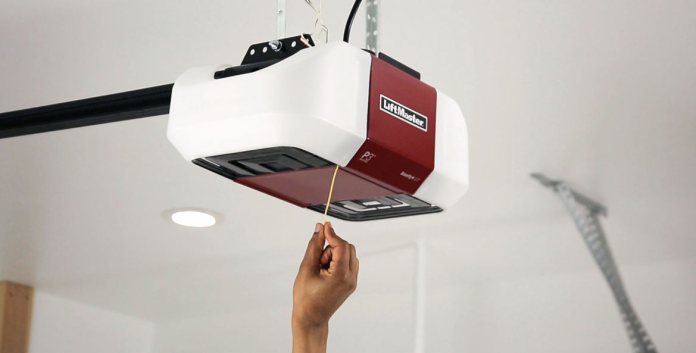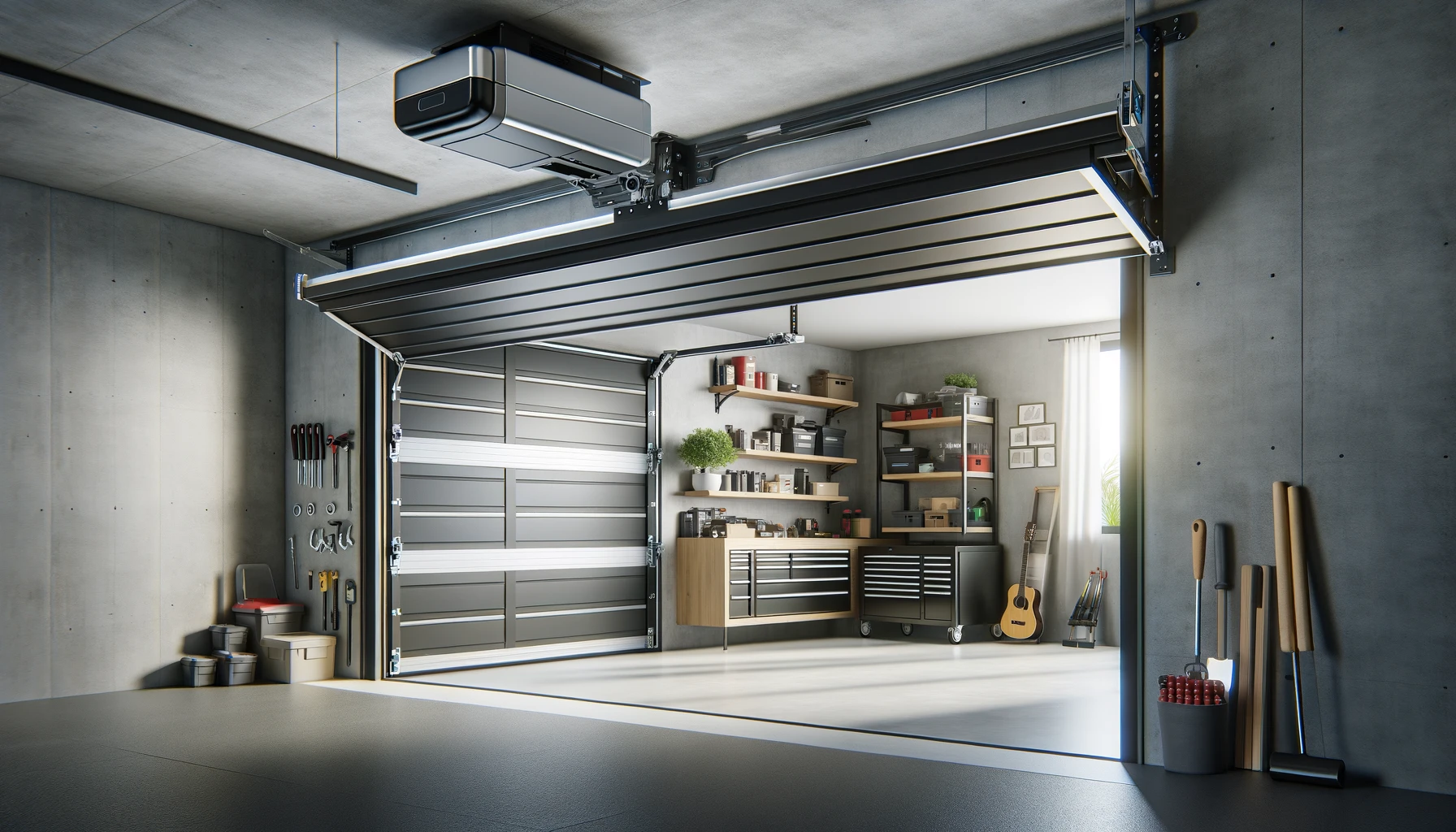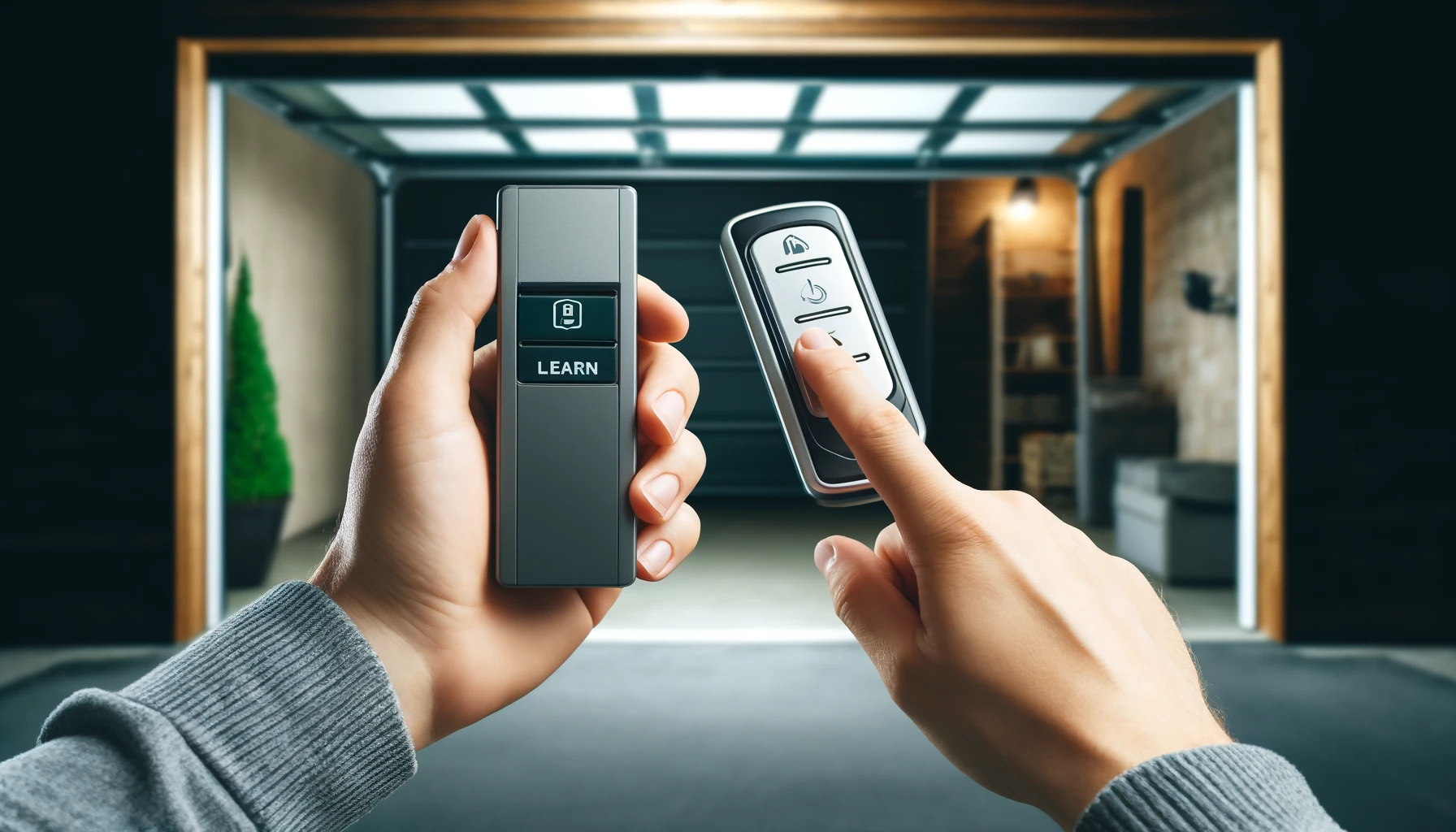Garage doors are a crucial part of home security and convenience. However, when your garage door starts opening unexpectedly, it can be both puzzling and alarming. This issue not only poses a security risk but also disrupts your daily routine. Understanding the reasons behind this problem is essential for effective troubleshooting and maintenance.
In this article, we have explained the common causes of a garage door that keeps opening by itself. From faulty remote controls and sensor problems to wiring issues and power surges, we cover all the potential culprits. For each issue, we provide detailed explanations and solutions that professional technicians recommend, ensuring you can address the problem effectively.
Whether you’re dealing with interference from electronic devices or need to update outdated software, this guide will help you identify and fix the issue. Regular maintenance and timely professional help can prevent many of these problems, ensuring your garage door operates smoothly and reliably.
Faulty Remote Control
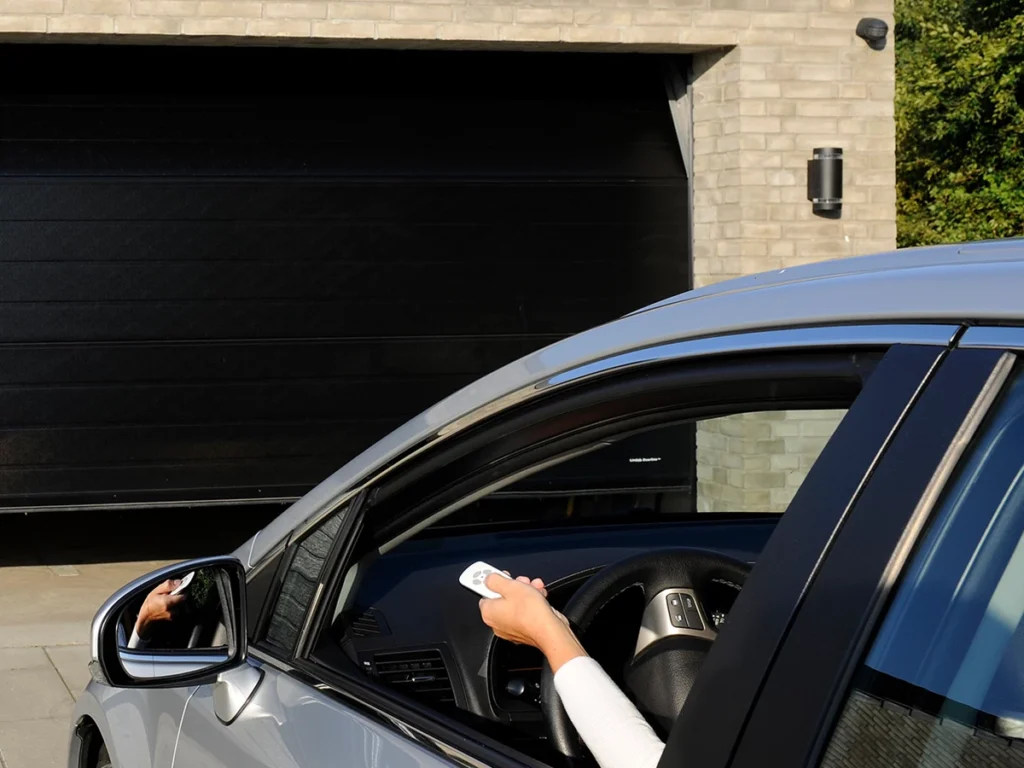
Possible Reasons:
- Low Battery: Remote controls require batteries to function, and when these batteries run low, the signal can become weak or intermittent.
- Internal Malfunction: The remote’s internal circuitry can wear out or get damaged over time, leading to unreliable performance.
- Signal Interference: Nearby electronic devices can interfere with the signal from the remote to the garage door opener.
Solution:
When a remote control is suspected to be the cause of a garage door opening unexpectedly, the first step is to check and replace the batteries. A technician can test the remote with a fresh set of batteries to see if the issue persists. If the remote is still malfunctioning, it might be due to internal faults. In this case, a professional can open the remote, inspect the circuitry, and determine if it needs repairs or a complete replacement. Additionally, technicians can use specialized tools to check for signal interference from other electronic devices. If interference is detected, they can change the frequency of the garage door opener or recommend upgrading to a model with rolling code technology, which is less susceptible to interference.
Stuck Buttons
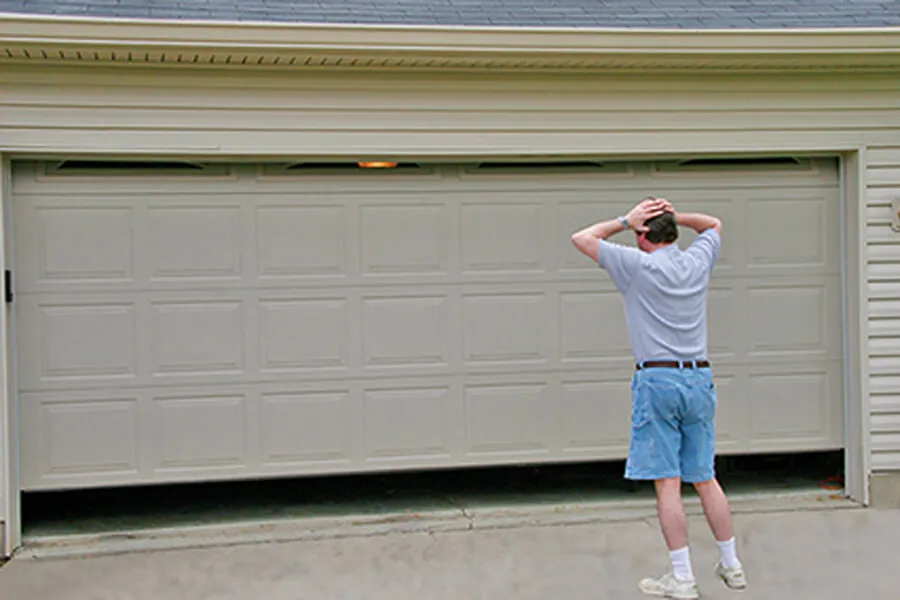
Possible Reasons:
- Dust or Debris: Buttons can become stuck if dust or debris accumulates in the gaps around them.
- Wear and Tear: Over time, frequent use can cause the buttons on the remote or wall control unit to wear out or become damaged.
Solution:
A professional can start by cleaning the buttons thoroughly, removing any dust or debris that might be causing them to stick. If the buttons are still not functioning correctly after cleaning, the technician can inspect the remote or wall control unit for signs of wear and tear. In cases where the buttons are worn out or damaged beyond repair, replacing the remote or wall control unit may be necessary. Technicians can also provide advice on how to prevent dust and debris from accumulating in the future, such as by keeping the remote and wall control unit clean and stored properly.
Interference
Possible Reasons:
- Electronic Devices: Other electronic devices, such as cordless phones, baby monitors, or Wi-Fi routers, can interfere with the signal from the garage door remote.
- Similar Frequencies: Nearby remote controls or garage door openers operating on similar frequencies can cause interference.
Solution:
A technician can identify sources of interference by using a frequency analyzer to detect any electronic devices that might be affecting the garage door opener’s signal. Once the interfering device is identified, the technician can recommend relocating it or changing its frequency if possible. For interference from similar frequencies, the professional can reprogram the garage door opener to a different frequency. Upgrading to a garage door opener with rolling code technology can also help mitigate this issue, as it changes the frequency with each use, making it less likely to experience interference.
Wiring Issues
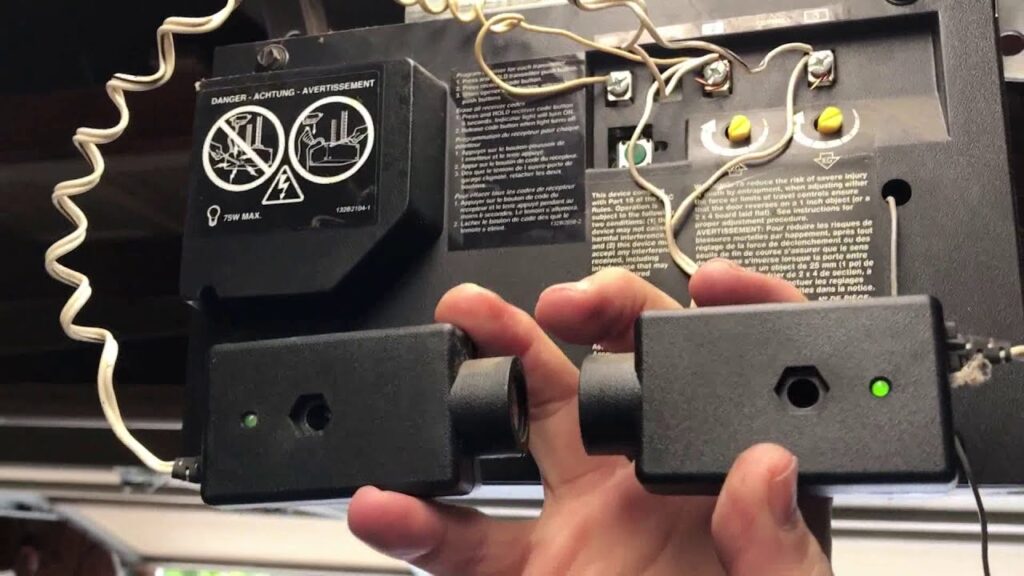
Possible Reasons:
- Damaged Wires: Wires can become frayed, cut, or otherwise damaged over time.
- Loose Connections: Connections can become loose due to vibrations or poor installation.
Solution:
A professional technician can perform a thorough inspection of the garage door opener’s wiring. They will look for any signs of damage, such as frayed or cut wires, and ensure all connections are secure. If damaged wires are found, the technician can replace them with new ones. Ensuring that all connections are tight and secure can prevent future issues. Regular maintenance and inspections by a professional can help identify potential wiring problems before they cause the garage door to malfunction.
Sensor Problems
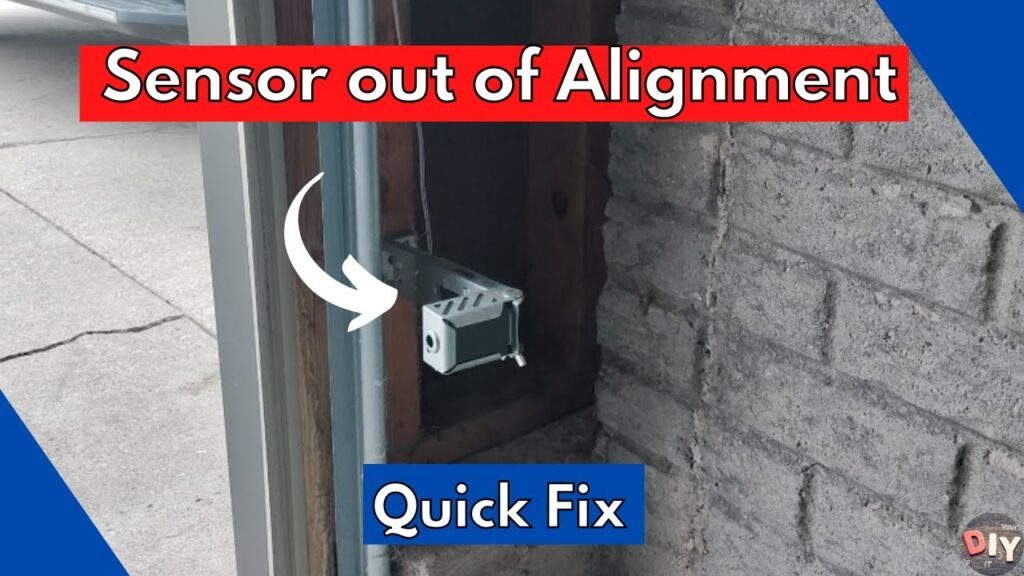
Possible Reasons:
- Misaligned Sensors: The safety sensors at the base of the garage door tracks can become misaligned, causing the door to behave unpredictably.
- Obstructed Sensor Lenses: Dust, dirt, or other obstructions on the sensor lenses can interfere with their operation.
Solution:
A professional can check the alignment of the safety sensors and adjust them as needed. They will ensure the sensors are facing each other directly and are not tilted or moved out of place. Cleaning the sensor lenses with a soft cloth can remove any dust or dirt that might be obstructing them. If the sensors are damaged or malfunctioning, the technician can replace them with new ones. Regular maintenance and cleaning of the sensors can prevent these issues from recurring.
Power Surges
Possible Reasons:
- Electrical Surges: Power surges from lightning strikes or issues with the electrical grid can disrupt the garage door opener’s system.
Solution:
A professional can install a surge protector to protect the garage door opener from future power surges. Surge protectors can be installed at the electrical panel or directly on the garage door opener. If a power surge has already caused damage, the technician can assess the extent of the damage and replace any affected components, such as the control board or the entire opener. Regular inspections and maintenance can help ensure the garage door opener remains in good working condition.
Control Board Malfunction
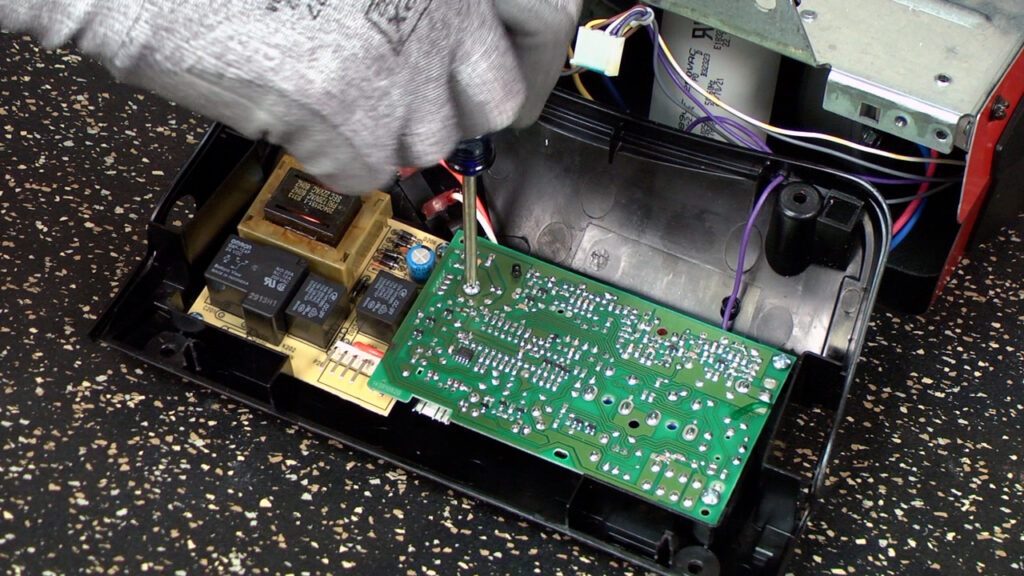
Possible Reasons:
- Defective Control Board: The control board inside the opener can become defective or damaged over time.
Solution:
A technician can open the garage door opener and inspect the control board for signs of damage, such as burnt components or loose connections. If the control board is found to be defective, the technician can replace it with a new one. Replacing the control board requires specific knowledge and tools, so it’s best left to a professional. Regular maintenance and inspections can help detect potential issues with the control board before they cause significant problems.
Programming Issues
Possible Reasons:
- Accidental Programming Errors: The garage door opener might be accidentally programmed to respond to another remote or control system.
- Unintended Remotes: The opener might respond to unintended remotes due to programming errors.
Solution:
A professional can reprogram the garage door opener and remote controls according to the manufacturer’s instructions. They will clear any unnecessary codes from the opener’s memory to prevent unintended remotes from operating the door. Regularly checking and updating the programming of the garage door opener can help prevent these issues from occurring.
Neighbor’s Remote
Possible Reasons:
- Similar Frequencies: Older garage door openers might respond to a neighbor’s remote due to similar frequencies.
Solution:
Technicians can upgrade the garage door opener to a model with rolling code technology. This technology changes the frequency with each use, making it less likely to respond to a neighbor’s remote. Replacing an older opener with a newer model can also provide additional security features and improve overall performance.
Weather Conditions
Possible Reasons:
- Extreme Weather: Lightning, high humidity, or other extreme weather conditions can affect the garage door opener’s electronics.
Solution:
Professionals can ensure the garage door opener is properly insulated and protected from the elements. Installing a surge protector can protect the opener from lightning strikes and power surges. For persistent weather-related issues, a technician might recommend upgrading to a more weather-resistant model. Regular inspections and maintenance can help ensure the opener remains in good working condition, regardless of weather conditions.
Manual Release Triggered
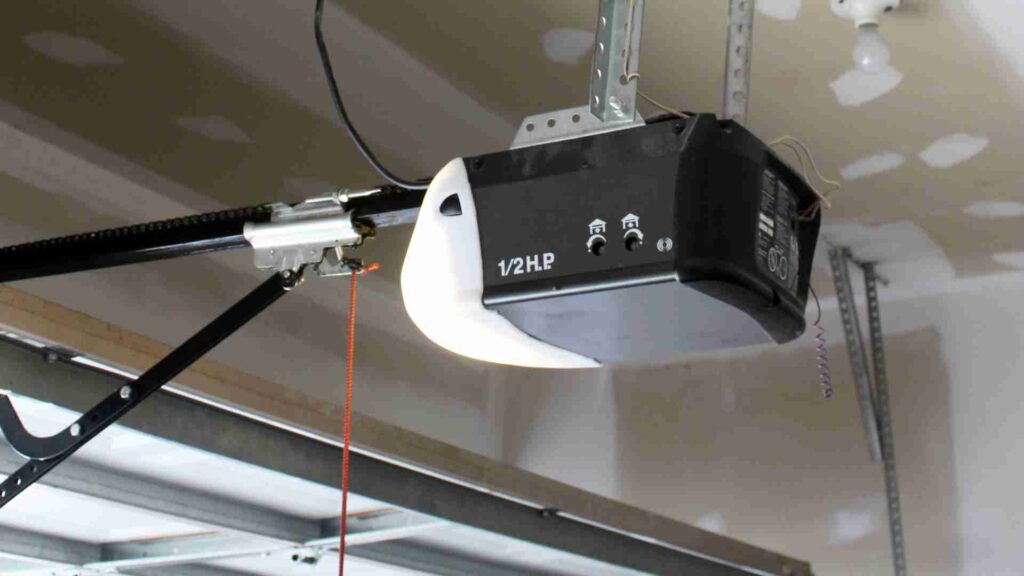
Possible Reasons:
- Partially Engaged Manual Release: The manual release mechanism might be partially engaged, causing the door to open unexpectedly.
Solution:
A technician can check the manual release mechanism to ensure it is fully engaged. If the mechanism is damaged or worn, the professional can replace it with a new one. Properly engaging the manual release mechanism can prevent the door from opening unexpectedly. Regular maintenance and inspections can help ensure the manual release mechanism remains in good working condition.
Outdated Software
Possible Reasons:
- Old Software or Firmware: Older garage door openers might have outdated software or firmware that causes malfunctions.
Solution:
Technicians can check for any available updates from the manufacturer and install them. If updates are unavailable, they might recommend replacing the opener with a newer model that includes the latest technology. Regularly updating the software or firmware of the garage door opener can help prevent malfunctions and improve performance.
Debris in Tracks
Possible Reasons:
- Debris or Obstruction: Debris or obstructions in the tracks can cause the garage door to open unexpectedly as a safety measure.
Solution:
Professionals can inspect and clean the tracks, removing any debris or obstructions. Lubricating the tracks and rollers can ensure smooth operation. Regular maintenance and cleaning of the tracks can prevent these issues from occurring and extend the life of the garage door system.
Power Supply Issues
Possible Reasons:
- Inconsistent Power Supply: Inconsistent power supply or loose connections can result in erratic behavior of the garage door opener.
- Loose Connections: Vibrations or poor installation can cause connections to become loose.
Solution:
A technician can inspect the power supply and connections to ensure they are stable and secure. If power supply issues persist, the professional can consult an electrician to inspect the electrical system. Regular maintenance and inspections can help identify potential power supply problems before they cause significant issues.

